Geelong champion Max Rooke shares the terrible toll concussions have had on his life
Memory loss, anger, pain and self harm: Geelong champion Max Rooke reveals for the first time the terrible toll concussions have had on his life — and why he’s not a victim.
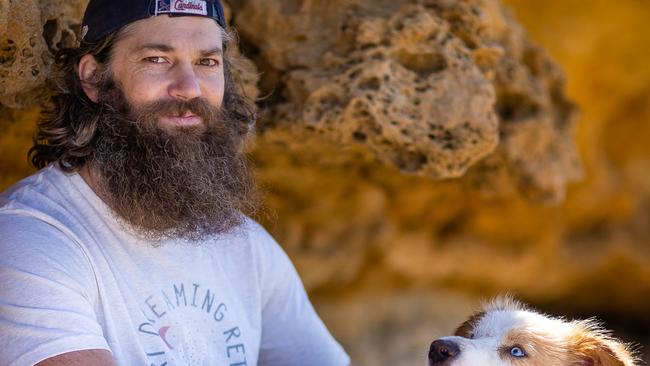
Victoria
Don't miss out on the headlines from Victoria. Followed categories will be added to My News.
By his own admission Max Rooke is an unlikely face of a landmark class action that aims to take the AFL to task over concussion-related injuries to players through almost four decades.
While considered a cult figure at Geelong where he was celebrated as much for his unruly hair and beard as for his fierce and physical play, he is at heart a reserved man.
Rooke, 41, is also a team player, a reliable and hardworking father who remains uncomfortable in the spotlight or on the receiving end of an accolade.
Even his adored mum, Jo, a retired schoolteacher, is surprised he is the front person, saying her caring son has never liked publicity, but she also understands he wants to help “get change happening”.
This is his first interview since he was named as the lead plaintiff in the class action that was lodged last Tuesday in the Supreme Court of Victoria.
He has come forward, he says, because he also wants to help others.
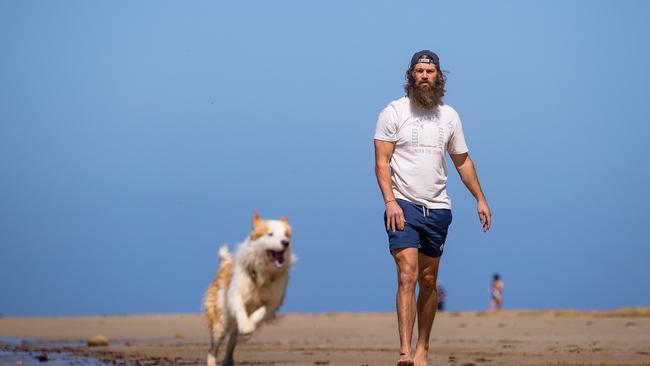
The dual Geelong premiership player told the Herald Sun he had a realisation that he needed to pick himself up and channel his energies into something productive and positive.
He decided it was time to shift his focus in life to helping himself without medication, and to helping others.
He travelled to Poland to study the Wim Hof Method that combines breathing, cold therapy and commitment to connect body and mind.
Court documents allege Rooke was concussed at least 20 times in his career and that the gritty and determined utility player lost consciousness at least twice.
His mum says in the first two years he was at Geelong she could not eat or drink during games because she was so uptight.
“I would sit there during a game saying under my breath ‘put him on, put him on’,” she says.
“But after a couple of years I would be sitting there saying under my breath ‘take him off, take him off’. It’s beyond a mum’s control. And really, it’s beyond a player’s control.”
Of his concussions he says towards the end of his elite football career, the slightest knock had an impact.
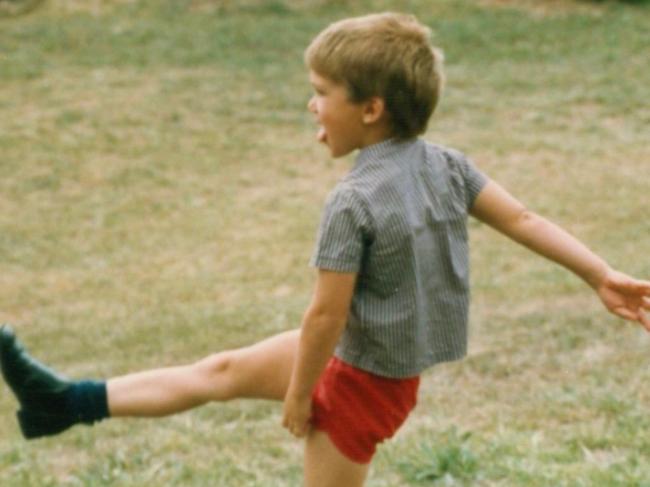
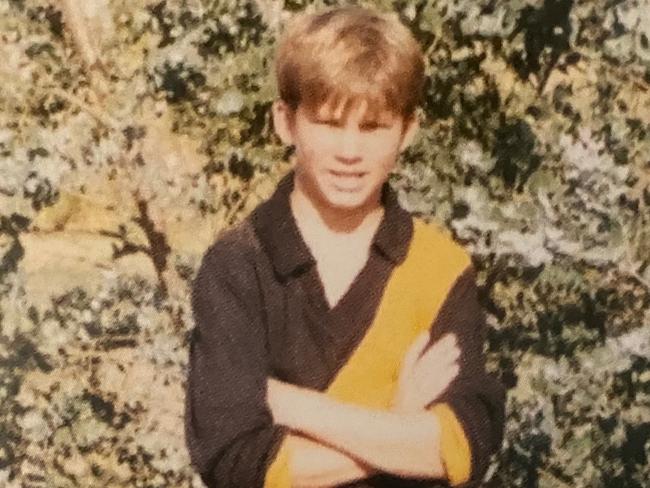
“It seemed that the more they occurred, the easier they occurred next time,” he says.
“I can’t really remember when I first thought or knew that the impact of the head knocks was going to be permanent. I know that I began to feel irritation in my body that I had never felt before. I had anger issues that I had never had before.
“I had memory loss and mental blanks like I hadn’t encountered before. I began to cause self-harm, which hadn’t come up before.
“I began to experience spasms throughout my body, mainly in my legs, that I couldn’t control; that can be pretty scary, not just for me but more so for my partner.”
He says the environment he was in was all based around the team and giving everything for the team: “I had to fight for my spot, and I wasn’t going to give that up easily.”
Rooke’s first concussion occurred when he was 19.
“There were times after concussions I saw stars and there was at least one other time I was sent back to play after losing consciousness,” he says.
Concussion had an effect on his judgment.
“I repeatedly misjudged parking my car the days following the concussion, and I would sometimes hit lamp posts and poles when trying to park,” he says.
Recalling these incidents still takes a toll.
“It hits my legs straight away and begins to creep up my body,” he says. “I feel exhausted, slightly angry and very irritated … I get close to tears and my head becomes foggy.”
He opens up about the way his mood started to change and how he felt “terrible” about the way he treated his parents back then.
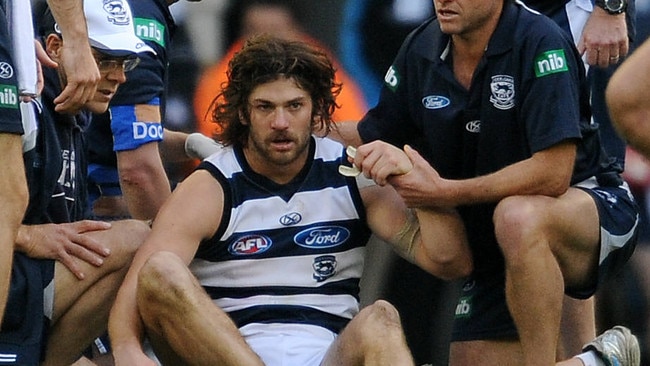
The mum who pulled on gumboots to kick a ball with him in the paddocks, the dad who always found time to teach him tackling skills would often be ignored despite having driven up to five hours to watch him play.
“Sometimes I would make them wait up to two hours post-game … hoping they would leave … but they would still be there,” he says.
“I would sit in my car and cry or just sit there, disgusted at who I’d become as a person and the way I was treating them. I knew it wasn’t who I was, but I felt like I had no control over my mood.”
He started self-harming, Rooke says, and there were times he felt the concussion injuries put him into a state of thinking “I don’t care if I die today on the field”.
“In my first couple of years at the club I was a different person, I was positive about my prospects, I was dedicated and driven,” Rooke says.
“I was awarded most determined and dedicated in 2002 for Geelong, my first full season playing AFL.”
A few years later Rooke says he was diagnosed with depression and medicated.
“Post my career finishing I hit even lower points and began to stress over the long-term effects of my head trauma,” he says. “I felt like my memory was poor, my motivation was very low and I was quick to blame others. It affected relationships.
“Last week was the first time that I’ve been able to openly speak about my traumas in detail without breaking down.
“I’ve had a heavy, exhausted head and irritation throughout my body since that’s yet to subside, but I feel like my body is ready to handle it now and I’m ready to work through it, because I’ve spent some years trying to improve my emotional and physical health and although it’s still extremely difficult to talk about, I feel like it needs to be done.”
Rooke does worry about the future and says no one can tell him how he will be in years to come.
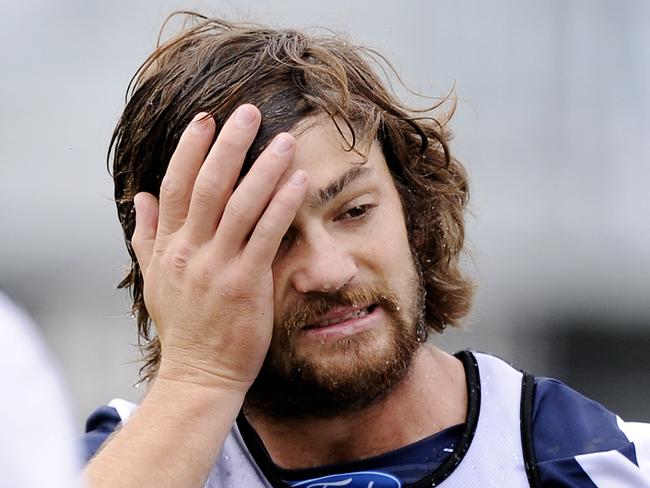
“But I don’t live in fear about it,” he says. “I am trying to live in the present and be proactive about making positive changes and improving my health.
“My injuries have taken me to some dark places, but I feel that I have done a lot of work to get to a point where I can speak about it and help others.
“I want to be an advocate for positive change and solutions, not a victim.”
There are now 80 players who are part of the class action lodged against the AFL last Tuesday in the Supreme Court by Melbourne firm Margalit Injury Lawyers.
It was lodged on behalf of all AFL players who suffered concussion-related injuries through head strikes while training or playing in the league from 1985 to March 14, 2023.
More Coverage
Originally published as Geelong champion Max Rooke shares the terrible toll concussions have had on his life





